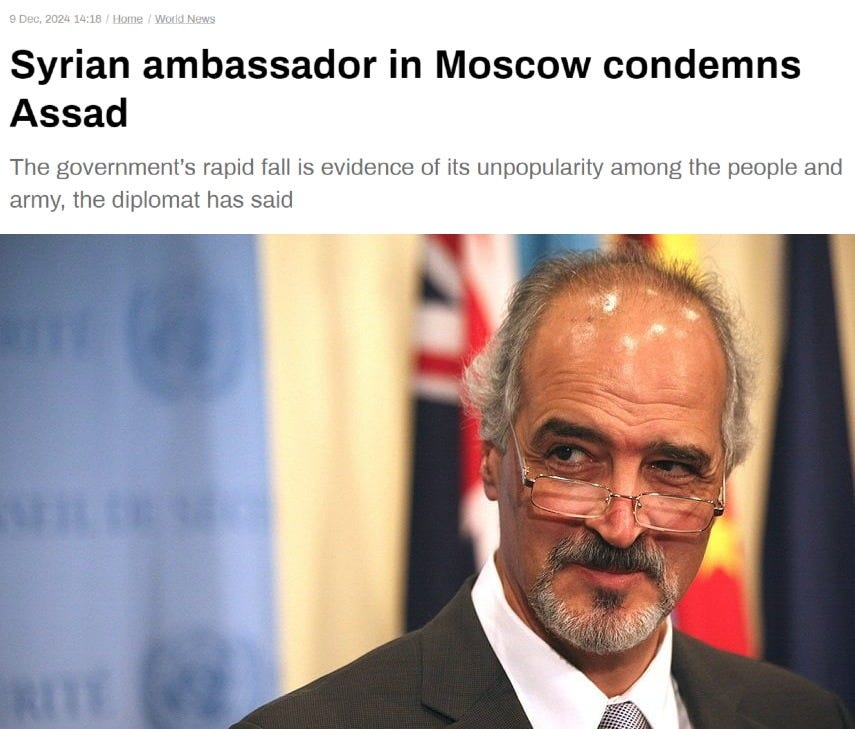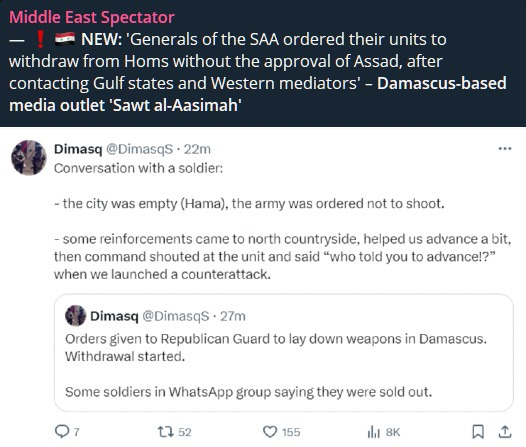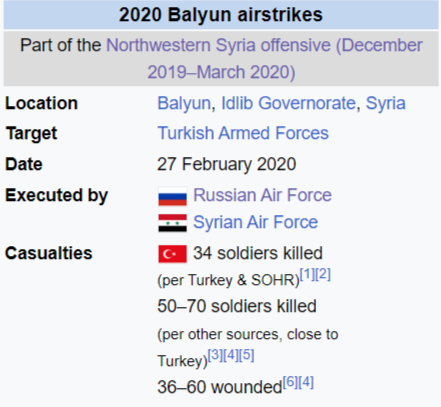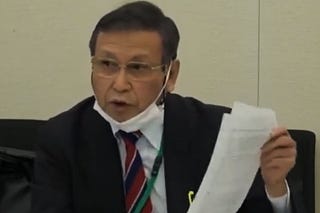
Syria's Fall: In-Depth Analysis
Syria has fallen, and history will be strewn with an endless banquet of takes and interpretations as to what happened, how, and why.
Syria has fallen, and history will be strewn with an endless banquet of takes and interpretations as to what happened, how, and why. Here I offer one humble middle approach to piece it together, supported by facts and some deductive reasoning, rather than emotional gut reactions.
What do we know so far?
Firstly, there are now indications ‘rebels’ informed Turkey of their intentions to launch an offensive on Aleppo six months ago, according to Reuters:
The armed Syrian opposition, which took power in Damascus the day before, informed the Turkish side six months ago of its intention to launch a large-scale offensive against the official Syrian authorities, Reuters reported.
“Syrian opposition groups... informed Turkey about plans for a major offensive about six months ago and believed that they had received its tacit approval,” the news agency reported.
At the same time, the United States said that Washington was not aware of Ankara’s “tacit approval” of the armed Syrian opposition’s plans to attack the Aleppo province in the north of the Arab Republic.
I mostly agree with Scott Ritter’s take here that the operation was never meant to topple all of Syria and that this became a kind of emergent improvisation after all the hyenas of the region saw how weak Syrian armed forces were in responding to the initial foray. There is ample ancillary evidence to suggest the assault was initially meant to be limited—but of course grew in scope as Israel, US, Turkey, and others began to see opportunity and activated their various sleeper cells, as well as began to secretly court Syrian generals and other influential army figures to essentially surrender or betray Assad in one way or another.
Here’s one analyst’s take on how the militants did not expect such success. It mentions that the Russian army reportedly offered to upgrade and train the SAA much more directly several years ago, but was for some reason refused.
We now have a better understanding of why, precisely, events unfolded, and how Syria had become so weak, directly from first hand sources. Though he’s the least trustworthy character, Erdogan explained that he had offered Assad a deal—in his words—to bring back some Syrian refugees as well as for Assad to influence Kurds on the Turkish border to pull back. One suspects there’s much more to the ‘deal’ than Erdogan reveals, but other figures have somewhat corroborated the above.
Here, Iranian Foreign Minister Abbas Araghchi openly reveals that Assad had become too inflexible in being open to the Astana process ‘dialogues’ with the opposition:
First he mentions that Assad himself was shocked at his own army’s collapse. The FM implies Assad had poor working knowledge of the internal situation of his own military, which we’ll get to in a moment.
Then he lays it out:
“It must be said that the path did not progress as well as expected, and Mr. Assad’s government in this regard was somewhat inflexible and slow in making progress.”
But now the Syrian ambassador to Russia himself, Bashar al-Jafaari, went even further in condemning the decadence under Assad:
The government’s rapid fall is evidence of its unpopularity among the people and army, the diplomat has said.
Granted, he could just be trying to curry favor with the new ‘administration’ to jockey for a job, but his words seem to echo other officials in close contact with Assad’s government:
Commenting on the developments, al-Jafaari condemned the former president and suggested that his ousting was long overdue.
“The collapse of the corrupt system in a matter of days is evidence of its unpopularity and lack of support both in society and among the army and the armed forces,” the diplomat told RT.
He added that the “shameful and humiliating escape of the head of this system under the cover of night, without any sense of national responsibility to the country, confirms the need for changes that have occurred.”
Al-Jafaari further hailed the regime change, stating that Syria has “finally become a true homeland for all Syrians” and called on its people to unite and cooperate in restoring security.
WaPo likewise cites a Syrian diplomat in claims that Assad refused a last minute deal to cut ties with Iran, which I mentioned last time:
On the eve of his overthrow, former Syrian President Bashar al-Assad refused a deal with the United States on Damascus ceasing logistical assistance to Tehran and providing its territory for the delivery of aid from Iran to the Lebanese Shiite organization Hezbollah in exchange for a gradual lifting of American sanctions, The Washington Post (WP) reported, citing former Syrian diplomat Bassam Barabandi.
More fatal for Assad, according to WP, was his refusal to establish relations with Turkish President Tayyip Erdogan, who offered to normalize relations with Damascus in exchange for containing Kurdish formations and the return of at least some of the Syrian refugees to the territory of the Arab Republic.
There are other perspectives, of course. For instance, here an Iranian hardliner claims that the ‘progressive’ new president Masoud Pezeshkian simply did not allow Iranian forces to fight in Syria:
Iranian hardliner and expert on Syrian affairs Sohail Karimi claims that the reformist government of Pezeshkian does not allow Iranian troops to fight in Syria:
"We are not allowed to fight in Syria.
We gave 6,000 martyrs in Syria to fight these terrorists, their death should not be in vain…"
And here former deputy of the Iranian Quds forces says Turks and other Arab countries deceived Tehran, which was reportedly ‘worried about movement in Idlib two months ago’.
"We asked the Turks and some Arab countries and received assurances that there would be no movement. Hakan Fidan in particular told us this. I wish we had not been deceived by them and had taken precautions and reinforced our forces in Syria."
Many people obviously feared that Pezeshkian would be some kind of Western-liberal plant, but I don’t think it’s so black and white. A combination of the above factors was clearly responsible for what happened and how rather than direct and pre-planned betrayal on the part of the Iranians or Russians.
There are many videos of SAA soldiers condemning the army, Assad, etc., during the events of the past few days. Here one angry SAA soldier shouts that Hezbollah Radwan special forces sold them out, Iran, Russia, and Assad himself all ‘sold them out’:
I’ve now seen statements that Hamas supports the revolution and welcomes the new Syrian government, so you can add them to the list too.
In reality, people in their confusion have blamed everyone. Many for instance blame Russia, and perhaps Iran, for not allowing Syria to “go all the way” in 2018-2020, to finish off Idlib, which would have prevented all the foregoing events. The same goes for locking Syria into the Astana and Sochi agreements.
The problem is, such people have short memories and do not realize the situation was not so simple. Though Syria churned through the jihadists’ strongholds in the 2018-2020 campaign, the fact of the matter is Idlib was deemed strictly off limits by both Turkey and the US:

You might ask: surely Russia isn’t afraid of both Turkey and the US and could protect Syria against them both? Well, Russia tried—see the Balyun strikes where both the Russian and Syrian airforce devastated Turkish columns, leaving ~70 Turkish troops dead.
The problem is, an angered Turkey then launched an offensive into Idlib which utilized Bayraktar drones in devastating swaths of Syrian armor and personnel. Depending on who you believe, the SAA was effectively “crippled” by the attacks, having lost nearly 100 pieces of heavy armor, artillery, air defense, and hundreds of men or more. As you can see, ideations about conquering Idlib at the time aren’t as realistic as some believe. The US and Turkey were both prepared to go to war to save their Al-Qaeda stronghold, and Russia astutely saw fit to compromise and “quit while they were ahead”, since the SAA had just recaptured huge amounts of land up to the Idlib deconfliction zone; and so Russia and Turkey formalized another addendum to the Astana process to deconflict at that time.
Think about it from Russia’s perspective, western Syria was mostly recaptured save for a tiny strip in the north—was WWIII really worth trying to recapture one last town whose residents hated Assad to begin with? It wasn’t Russia’s fault that after that time—as we now know—Syria began a slow painful decline, owing to the US’ economic terror and strangulation of its economy.
Happy Holidays from the Art of Liberty Foundation!
We Goofed! Our discount code for 20% didn’t work on December 8th so we are extending the 20% discount until midnight on Thursday, December 12th!
Celebrate the season with special discounts:
20% off from December 5th-12th with the code Liberty20
15% off from December 13th-16th with the code Liberty15
10% off from December 17th until Christmas with the code Liberty10
Shop for unique books and gifts now at Government-Scam.com/store and make this holiday season extra special!






















